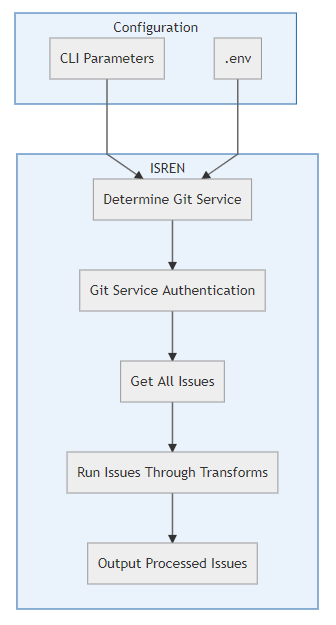isren v1.1.0
ISREN
ISsue Rendering ENgine
ISREN is a tool aimed at providing an easy interface for pulling issue data out
of a hosted Git implementation. ISREN will pull all of the issues for the given
<hosted_git_url> provided at run-time. For repeatable data transformations, a
transform system is available for writing custom middleware.
$ isren -h
Usage: isren [options] <hosted_git_url>
isren - ISsue Rendering ENgine
Options:
-v, --version output the version number
-a, --auth <token> Hosted git API authentication token
-k, --insecure Ignore SSL certificate check
-d, --debug Enable debug mode
-t, --transform <transform file path> Path to custom transform file
-o, --out <Output file format> The format of output file
--out-options <Output options> Additional options for output configuration
--issue-options <Issue options> Additional options for the Issue pulling
-f, --file <Output file path> The path of output file
-h, --help output usage informationExamples
Output a CSV file:
$ isren -o csv,file -f output.csv https://gitlab.com/mygroup/exampleprojectUse a custom transform and output a JSON file:
$ isren -f /path/to/transform.js -o json,file -f output.json https://gitlab.com/mygroup/exampleprojectDocumentation
Additional Docs
Data Flow
Data flow within ISREN can be visualized with the following graphic. For every change to the internals, the graphic should be updated, see CONTRIBUTING.md

Configuration
Configuration for ISREN is controlled by CLI parameters and/or a .env file.
CLI parameters override any configuration set inside your .env, so params can
be used for one-off changes to normal runs of ISREN.
.env
To get started with a .env file, you can copy the .env.example file:
$ cp .env.example .envAvailable .env variables
AUTH- The auth token to use
GITLAB_URL- An override for custom GitLab urls, used for private enterprise versions of GitLab.
DEBUG- Enables additional debug logging.
ISSUE_OPTIONSOUTPUT_OPTIONS
Options
Version
-v, --version
- Get the current version of ISREN
Authentication
-a, --auth
- Set the authentication token for the session
Insecure
-k, --insecure
- Allow insecure/self-signed ssl certificates
Debug
-d, --debug
- Enable debug logging
Transform
-t, --transform
- Enable one or many (csv delimited) transforms for the session
Output
-o, --out
- Configure the output mode(s), available options:
- CSV
- input: array
- output: string
- JSON
- input: array
- output: string
- Console
- input: any
- output: any (whatever was input)
- File
- input: any
- output: any (whatever was input)
- CSV
Note: The order of the outputs is important! Data flows from the first defined output to the last, each output requires that the preceding output returns expected input data. Because of this, some outputs cannot be used together, the input/output must match for each output, e.g.
-o csv,fileworks, but-o csv,jsondoes not.
Output Options
--out-options
Enable additional output options for the session
Additional output file options, currently only used for CSV export types. This value is expected to be a valid JSON object using these options. For example, to change the CSV delimiter to
|:// CLI --out-options='{"delimiter": "|"}' // .env OUTPUT_OPTIONS={"delimiter": "|"}
Issue Options
--issue-options
Additional filtering for issue fetching. This value is expected to be a valid JSON object using these filtering options. For example, to filter based on creation date:
// CLI --issue-options='{"created_after": "2019-08-01T00:00:00.000Z"}' // .env ISSUE_OPTIONS={"created_after": "2019-08-01T00:00:00.000Z"}
File
-f, --file
- The output file name and path.
- Only used when the Output file option is included
Help
-h, --help
- Display the help output.
Transforms
Transforms are a powerful concept in ISREN that allow us to transform issues, one at a time, to shape the internal data into a format that better serves us.
For example, given the following example issue:
{
"id": 12345,
"description": "lorem ipsum ..."
}If we wanted to re-key the id to say issue_id, we can use write the
following transform
// MyTransform.js
//
// usage:
// $ isren --transform path/to/MyTransform.js
(function(issue) {
// Add/edit our new field.
issue.issue_id = issue.id;
// Delete the old field
delete issue.id;
// Return the modified issue.
return issue;
});When a transform, one or more, is provided, each issue is run through the transform before it goes through the output method, another type of transform! Currently, only synchronous transforms are supported.